SOUTH PORTLAND – The church is more than 200 years old and looks it. Its white paint is peeling and cracking. The steeple has been removed because of rot.
The building has been maintained over the years with help from donations, but those gifts have slowed. There just aren’t enough people in the pews anymore when the collection plate is passed.
The First United Methodist Church on Brown’s Hill will host its final Sunday worship service Aug. 25 and close permanently, a victim of falling membership and increased maintenance costs.
Its demise is the latest sign of declining membership in many religious denominations nationwide and in Maine, the least religious state.
“It’s a sign of the times, I guess,” said Sharon Ward, the historian for First United Methodist Church, who grew up as a member and was baptized in the church. “People are not coming into our building, which means we need to do a better job going out to where they are.”
In 2010, the national Association of Religion Data Archives identified a total of 367,043 Maine residents who aligned with a religion, about 27.6 percent of the population. That was down nearly 9 percentage points from 2000, when 463,541 Mainers claimed a religion. Nationwide, the decrease was 2 percentage points over that time.
By comparison, Utah, at 79.1 percent, had the highest percentage of residents who claimed a religion, most of them Mormons. And in Southern states that make up what has been referred to as the Bible Belt, church membership rates were above 50 percent, according to the association’s report, which was released in May 2012.
Doug Allen, a philosophy professor at the University of Maine, said he noticed the state’s relative secularism when he moved here in 1974, and believes it will continue.
“Mainers often find identity and meaning in relation to nature and in communities outside traditional religions and institutions,” Allen said. “I think that there is also a Maine-New England tradition of individual free thinking, resistance to imposed authoritarian power, and respect for separation of private religious faith and the state and secular life.”
The Roman Catholic Church had the biggest decrease in membership in Maine from 2000 to 2010, losing more than 90,000 adherents (33 percent), but it still has the most members.
Several mainline Protestant denominations also dropped sharply. Among those with the largest number of adherents in Maine, the United Church of Christ (Congregational) lost 6,375 members (22 percent), American Baptists lost 5,749 (22 percent), the Episcopal Church lost 3,232 (21 percent) and United Methodists lost 3,360 (11 percent).
Nationwide, the Catholic Church lost about 5 percent of its members from 2000-10. The Episcopal Church’s membership dropped by 15.7 percent in the same period, and decreases in most mainline Protestant groups were similar.
A study last year by the Pew Forum on Religion and Public Life showed that, for the first time, the United States no longer has a Protestant majority, mostly because of a sharp increase in the number of people who claim no religious affiliation.
The percentage of Protestant adults in the U.S. was 48 percent, the study showed. About 20 percent of Americans said they had no religious affiliation, an increase from 15 percent five years earlier.
“This is a process that’s gone on for about 200 years,” said Stephen Pope, a professor of theology at Boston College. “The philosopher Max Weber said to live in a modern world is to be disenchanted.”
SOME RELIGIONS SEE GAINS
A handful of denominations are actually gaining members in Maine, in some cases because of active evangelism.
Mormons have gained 3,565 members since 2000, an increase of 50 percent, and Seventh-Day Adventists have gained 956 members, 36 percent.
Mormonism is the fastest-growing religion in 26 states, according to a study last year by the Association of Statisticians of American Religious Bodies.
Other gains were reported by unaffiliated evangelical or fundamentalist Christian groups.
The biggest losses have largely been in traditional, mainline churches and the biggest gains have been in relatively modern denominations.
“The old-line churches are in decline, often in crisis, and they will continue to lose members unless they are willing to adapt dramatically,” Allen said. “The record on the new churches and non-church forms of spirituality is mixed. Some may be more fads, but others have more staying power.”
Pope said some smaller religions can attract people by offering a sense of community. “There is the believing, but also a sense of belonging that is important to people,” he said.
Mormons, in particular, are well-organized recruiters. Most church members, when they turn 18, become missionaries for two years, during which they spend most of their time proselytizing door to door.
Marcus Hutchins, a regional spokesman for the Church of Jesus Christ of Latter-Day Saints, said individuals’ reasons for wanting to join the church vary.
“There is a sense that life in the church is happier and more fulfilling than outside the church,” he said. “In short, it works.”
One of the newest churches in the Portland area, the Next Level Church on Forest Avenue, has grown to nearly 300 members since it came to Portland in late 2010, said Daniel King, executive pastor of the church, which formed in New Hampshire in 2007.
The non-denominational evangelical church has tried to appeal to people who are not regular church-goers, King said. It uses modern music and social media to appeal to members, but King said the biggest part is providing practical spiritual advice.
“There is no secret or magic. We teach the Bible like everyone else,” he said.
Rising numbers in some churches are driven by migration. The numbers of Jews and Muslims in Maine have increased over the years because more people who are Jewish or Muslim have moved to Maine.
The data compiled by the Association of Religion Data Archives has shortcomings — some denominations are under-counted because church memberships are loosely tracked, for instance — but it is a comprehensive look at trends over decades.
The report includes, for the first time, a category for non-denominational Protestants. In Maine, 25,689 residents identified themselves as non-denominational, the third-largest category of religious affiliation.
The overall numbers confirm what other surveys have suggested: Maine is the least religious state and is becoming less religious.
Part of the reason is the age of its population. As more regular church-going residents die, fewer are replacing them in the pews.
CHURCHES CLOSING DOWN
As denominations lose members, they face decisions of whether to close specific churches. The age and condition of a church often informs that decision, as does the church’s proximity to other churches in the denomination. That was the case with First United Methodist in South Portland.
Ward, the historian, said her church has been crumbling for years. About 15 years ago, the steeple had to be removed because of rotting beams. It was never reinstalled.
With membership down, the amount of money collected has dwindled. Ward said she remembers more than 150 parishioners packing the pews when she was a child. Now, 20 people is a good showing on a Sunday.
South Portland has three other Methodist churches, Ward said, so members will have options after First United closes. The pastor, the Rev. Johanne Dame, is also a part-time pastor at another church.
Historical artifacts from the First United Methodist Church, including a bell made in the foundry of Paul Revere, will be donated to the South Portland Historical Society.
Ward said she isn’t sure what will happen to the building. Its future will be decided by the New England Conference of the United Methodist Church. Ward said the value of the building is limited.
According to the Association of Religion Data Archives, Maine lost 13 United Methodist churches from 2000 to 2010. The United Church of Christ closed 23 churches in the same period.
The Catholic Church closed 38 churches, in part because of its push to consolidate parishes. The Roman Catholic Diocese of Portland is selling off 30 properties, most of them church buildings. St. Patrick Church in Portland held its final Mass in May and has been sold to the owner of the adjacent Westgate Shopping Center.
Since three-quarters of Mainers don’t identify with a specific religion, the impact of a church closure isn’t felt by everyone, but for those who are affected, it can be significant.
“When these closings happen in bigger communities, they can contribute to urban blight,” said Pope, the Boston College professor. “But the bigger impact is, churches provide a social network and part of belonging for people. They connect families to neighborhoods.”
The closure of a church won’t change the faith of people like Sharon Ward.
“We always say ‘God’s spirit is everywhere,’” she said.
Eric Russell can be contacted at 791-6344 or at:
erussell@pressherald.com
Twitter: @PPHEricRussell
Correction: This story was revised at 11:30 a.m., July 31, 2013. An earlier version categorized the United Church of Christ as Presbyterian, which is how it was reported by the Association of Religion Data Archives. In fact, the UCC is considered Congregational.
Send questions/comments to the editors.


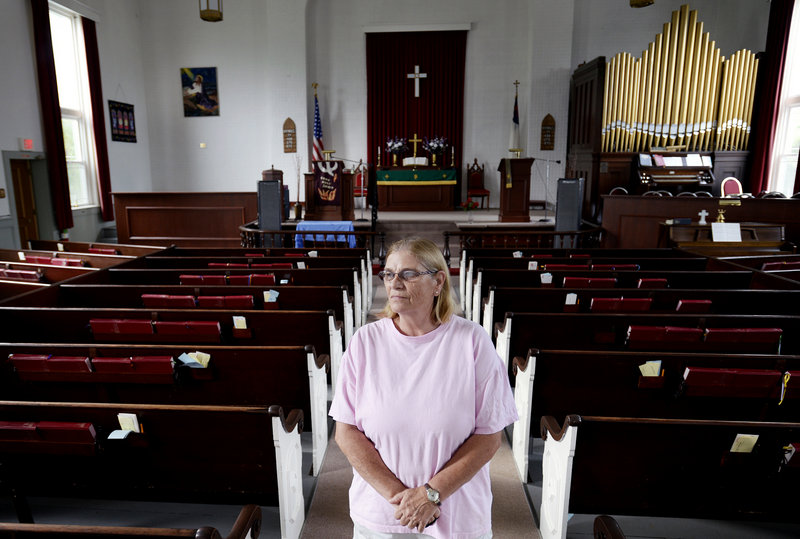
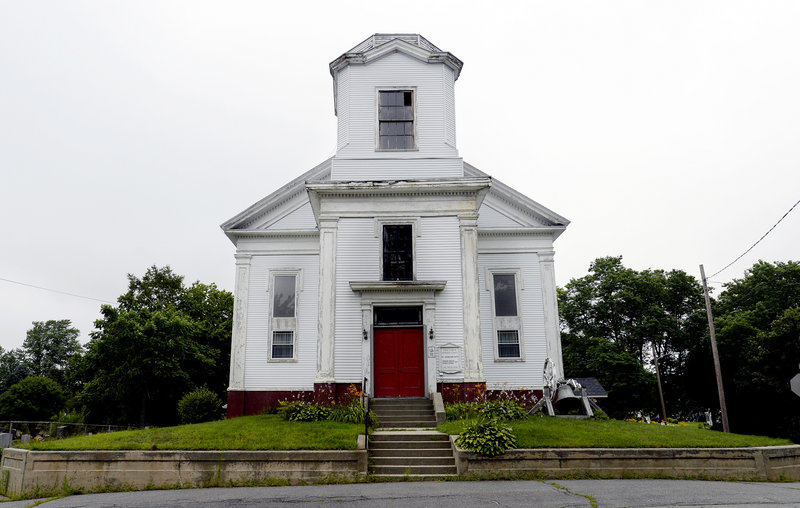
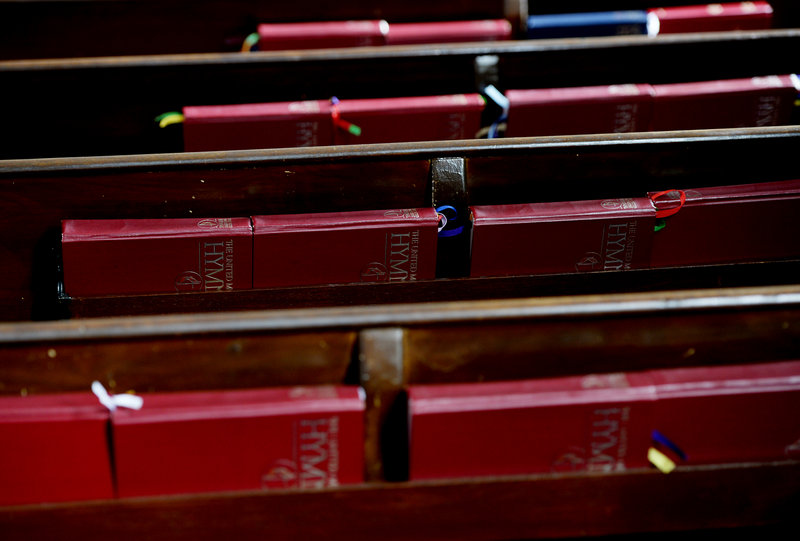
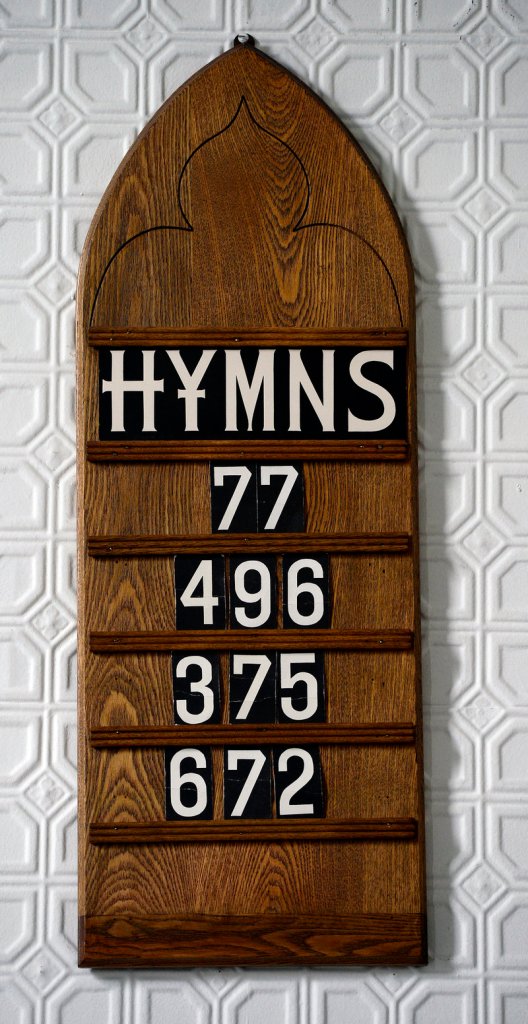
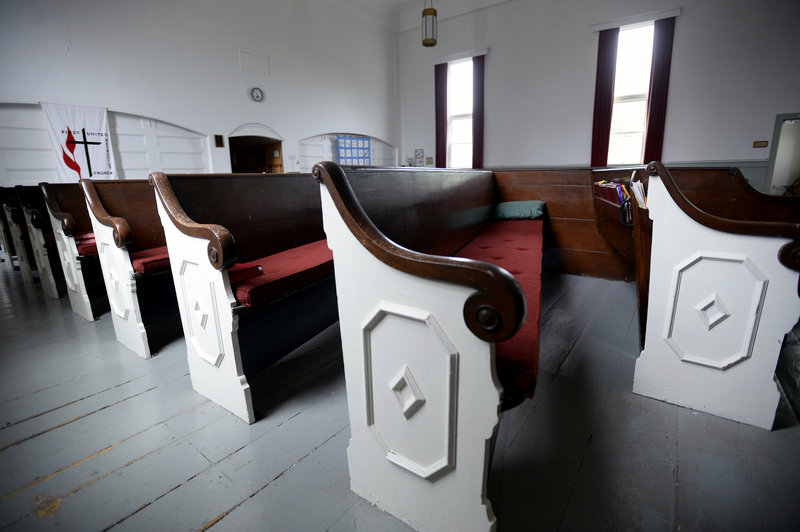

Success. Please wait for the page to reload. If the page does not reload within 5 seconds, please refresh the page.
Enter your email and password to access comments.
Hi, to comment on stories you must . This profile is in addition to your subscription and website login.
Already have a commenting profile? .
Invalid username/password.
Please check your email to confirm and complete your registration.
Only subscribers are eligible to post comments. Please subscribe or login first for digital access. Here’s why.
Use the form below to reset your password. When you've submitted your account email, we will send an email with a reset code.